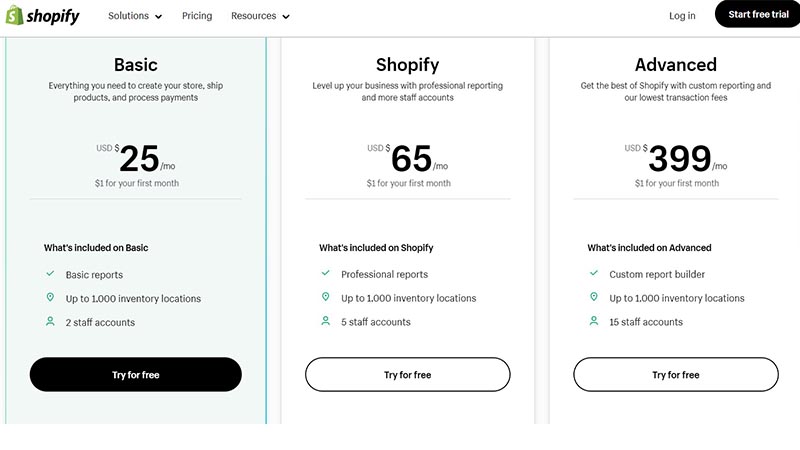Marketing & Advertising
Shopify Review: Is it the Best e-Commerce Platform?

Many options are available when building an online store, each offering unique features and benefits. Shopify has become the most reliable e-commerce platform, powering over 1 million online stores worldwide. Read our Shopify review to learn the strengths and weaknesses of Shopify and whether it’s the right choice for your business.
What is Shopify?

Shopify is a cloud-based e-commerce platform founded in 2006. Today, over 1 million businesses in more than 175 countries use it to power their online stores. Shopify provides several features and tools, including customizable templates, payment processing, inventory management, shipping options, and marketing tools, to help businesses create and manage their online stores quickly and efficiently.
Shopify offers third-party integrations with various applications and services, allowing businesses to extend the functionality of their online stores. Overall, Shopify is an all-in-one e-commerce solution that provides everything a business needs to create and manage a successful online store.
Let’s continue discussing the pros and cons of Shopify.
Ease of Use
Shopify is simple to use, even for beginners. Setting up your store is straightforward and can be done in a matter of minutes with the help of the intuitive dashboard. The platform offers various customizable themes tailored to fit your brand and style. The drag-and-drop interface simplifies adding products, creating pages, and managing your inventory.
Pricing

Shopify offers a range of pricing plans to suit different business needs and budgets. The Basic plan starts at $25 per month, while the Advanced plan goes up to $399 monthly. While the pricing may seem steep, it’s important to note that Shopify provides excellent value for money, considering its features and benefits. Moreover, Shopify does not charge transaction fees, making it a cost-effective option for businesses.
Features
Shopify is packed with features that make it a robust e-commerce platform. One of the standout features is its powerful inventory management system, which allows you to easily add and manage products, track inventory, and fulfill orders. Additionally, Shopify offers built-in SEO features that simplify optimizing your store for search engines. Moreover, the platform integrates with a wide range of third-party apps and tools, making it easy to extend the functionality of your store.
Payment Gateway Options
Shopify offers a range of payment gateway options, including its payment gateway, Shopify Payments. It is an excellent option for businesses seeking a hassle-free payment processing solution. It’s easy to set up, and there are no transaction fees. In addition, Shopify integrates with over 100 payment gateways, including PayPal, Stripe, and Apple Pay, allowing businesses to choose the payment gateway that best suits their needs.
Customer Support
Another essential aspect of this Shopify review is that the platform offers excellent customer support. It features 24/7 live chat, email, and phone support. Additionally, the platform provides a comprehensive knowledge base and community forums, making it easy to find answers to common questions and connect with other Shopify users.
Limitations
While Shopify is a great platform, it does have some limitations. One of the most significant limitations is its steep learning curve for advanced customization. While the platform is easy for basic tasks, businesses looking for advanced customization options may find it challenging. Some advanced features, including abandoned cart recovery and gift card creation, are only available on the higher-pricing plans.
Conclusion
We hope our Shopify review has provided you with enough information to help you in your search for the best e-commerce website. Shopify is an excellent e-commerce platform with powerful features and benefits. Its ease of use, comprehensive inventory management system, and payment gateway options make it a top choice for businesses of all sizes. Additionally, its customer support is second to none, with 24/7 support available via multiple channels. While there may be more affordable platforms, Shopify provides excellent value for money. Its robust feature set makes it a worthy investment for any online store.
Marketing & Advertising
Shopify vs WooCommerce: What’s the Right Platform for Your Online Store

In the rapidly expanding world of e-commerce, choosing the right platform to build and manage your online store is a pivotal decision. Two prominent contenders in this arena are Shopify vs WooCommerce. Both offer distinct features and advantages, catering to different needs and preferences. In this blog, we’ll delve into the pros and cons of each platform to help you make an informed decision for your e-commerce venture.
Shopify: Elegance in Simplicity

Shopify has gained widespread popularity for its user-friendly interface and hassle-free setup. It’s an all-in-one solution, meaning you don’t need to worry about web hosting, security, or technical maintenance – Shopify takes care of it all. This is particularly beneficial for entrepreneurs who lack extensive technical knowledge.
One of Shopify’s standout features is its theme store, offering a range of professionally designed templates. These themes are responsive and customizable, allowing you to create a visually appealing and functional store without significant design skills. Moreover, Shopify’s app store provides a plethora of add-ons to enhance your store’s functionality – from SEO optimization to inventory management.
However, this convenience comes at a cost. While Shopify offers multiple pricing plans, they all involve monthly fees, transaction fees, and sometimes additional charges for third-party apps. This can accumulate and become a significant expense for small businesses, especially those just starting.
WooCommerce: Flexibility and Control

WooCommerce, on the other hand, is a plugin for WordPress, making it an ideal choice for users already familiar with this platform. It’s an open-source solution, giving you unparalleled control over your store’s appearance and functionality. You can customize every aspect of your online store, from design to checkout process, using the vast array of WordPress themes and plugins.
Since WooCommerce is self-hosted, you’ll need to arrange your own web hosting and security measures. While this might seem daunting to some, it also means you have more control over the performance and security of your store. Additionally, WooCommerce doesn’t charge transaction fees, making it more cost-effective in the long run, especially for businesses with high sales volumes.
However, the level of control and customization that WooCommerce offers comes with a steeper learning curve. Setting up and maintaining your store might require more technical know-how or the assistance of a developer, which could potentially increase your upfront costs.
Making the Choice

Ultimately, the decision between the competition of Shopify vs WooCommerce boils down to your specific needs and preferences.
Choose Shopify if:
- You’re looking for an easy setup process with minimal technical involvement.
- Design and aesthetics are priorities, and you want a wide range of pre-designed themes.
- You’re willing to pay for the convenience of an all-in-one solution.
- Your business is growing, and you prefer not to deal with server management and technical details.
Choose WooCommerce if:
- You want unparalleled control over your store’s customization and functionality.
- You’re familiar with WordPress or are willing to invest time in learning it.
- Cost-effectiveness is crucial, as WooCommerce doesn’t charge transaction fees.
- You have the technical skills or resources to manage web hosting and security.
Conclusion
There you go, our take on Shopify vs WooCommerce. The platforms have their merits, catering to different types of online entrepreneurs. Shopify offers simplicity and ease of use, while WooCommerce provides flexibility and control. Assess your budget, technical skills, and customization requirements before making a decision. Remember, the platform you choose should align with your long-term goals and the unique identity of your online store.
Marketing & Advertising
Top Shopify Alternatives For Your E-Commerce Store

Top Shopify Alternatives For Your E-Commerce Store
In the ever-expanding world of e-commerce, establishing a robust online presence is vital for businesses of all sizes. While Shopify stands out as a popular choice for creating and managing online stores, there is a myriad of alternatives that cater to various needs and preferences. Whether you’re seeking greater customization, scalability, or simply exploring different options, here are some top Shopify alternatives that you should consider.
1. WooCommerce: The WordPress-Powered Gem

For those already familiar with WordPress, WooCommerce offers a seamless integration into the platform. This powerful plugin transforms your WordPress website into a fully functional e-commerce store. What sets WooCommerce apart is its extensive library of plugins and themes, allowing you to customize every aspect of your store. From payment gateways to inventory management, WooCommerce’s flexibility is a boon for those seeking tailored solutions.
2. BigCommerce: Scalability and Simplicity Combined
BigCommerce shines as a platform that strikes a balance between scalability and user-friendliness. It’s a suitable choice for both small businesses and enterprises, offering a comprehensive suite of tools. With features like multi-channel selling, customizable themes, and advanced SEO capabilities, BigCommerce empowers users to grow their businesses without compromising on user experience.
3. Magento: Unparalleled Customization for Large Enterprises

When it comes to extensive customization, Magento takes the lead. An open-source platform, Magento allows businesses to create truly unique e-commerce experiences. While it demands a certain level of technical expertise, its robust features are well-suited for large enterprises with complex requirements. From personalized marketing to advanced analytics, Magento empowers businesses to deliver tailored experiences to their customers.
4. Wix eCommerce: Simplicity and Aesthetics in One
Wix, known for its user-friendly website builder, offers a dedicated e-commerce module that maintains its signature simplicity. Wix eCommerce is an ideal choice for those who prioritize aesthetics and design. Its drag-and-drop interface and a plethora of templates enable users to create visually appealing stores without delving into intricate technicalities.
5. Squarespace: Merging Elegance and Functionality
Squarespace caters to artistic souls seeking a balance between elegant design and essential e-commerce features. With its visually stunning templates, Squarespace is perfect for small businesses with a focus on aesthetics. While it might lack some of the advanced functionalities of other platforms, it compensates with its easy-to-use interface and artistic flair.
6. OpenCart: An Open-Source Option for Flexibility

OpenCart is an open-source platform that strikes a balance between simplicity and flexibility. It’s an excellent choice for smaller businesses seeking to establish an online presence. With a range of plugins and themes, OpenCart allows users to customize their stores to fit their unique needs.
7. PrestaShop: Tailored Solutions for Growing Businesses
PrestaShop, another open-source Shopify alternative, places emphasis on catering to businesses that are in their growth stages. Its extensive marketplace of modules and themes enables users to build customized e-commerce solutions. PrestaShop’s active community also ensures that you’ll find the support you need as you navigate the platform.
8. Volusion: All-in-One E-Commerce Package
Volusion provides an all-in-one approach to e-commerce, offering hosting, design, and essential e-commerce tools in one package. While it might not offer the same level of customization as some other platforms, it streamlines the process of setting up an online store, making it ideal for those seeking convenience.
9. Shopware: Europe’s E-Commerce Gem
Shopware is a prominent player in the European e-commerce landscape. With a focus on user experience, it offers a range of features to enhance customer engagement. While it might not be as widely known as some other platforms, Shopware is a viable alternative for businesses seeking a user-centric approach.
Conclusion
Shopify is undeniably a popular choice, the e-commerce landscape is rich with alternatives catering to diverse needs. From WordPress-powered WooCommerce to the unparalleled customization of Magento, each alternative offers unique features to empower businesses to thrive in the digital realm. In choosing Shopify alternatives, consider your business size, technical expertise, customization requirements, and long-term scalability goals. By exploring these alternatives, you can find the perfect match for your e-commerce journey.
Marketing & Advertising
The Power of Simplicity: Exploring Canva Logo Maker

In today’s fast-paced digital world, establishing a strong brand identity is crucial for any business or individual. A well-designed logo serves as the cornerstone of this identity, symbolizing the essence of what a brand stands for and leaving a lasting impression on its audience. While creating a professional logo might seem like a daunting task, Canva Logo Maker has emerged as a game-changer, democratizing the design process and empowering everyone to craft stunning logos with ease.
The Rise of Canva: Revolutionizing Design for All

Canva, founded in 2012 by Melanie Perkins, Cliff Obrecht, and Cameron Adams, began as an online graphic design tool aimed at simplifying the design process for non-designers. Over the years, Canva has grown exponentially, transforming into a comprehensive design platform offering a wide range of tools, including the highly acclaimed Canva Logo Maker.
How Canva Logo Maker Works
At the core of Canva Logo Maker’s success lies its user-friendly and intuitive interface. With no prior design experience required, anyone can dive into logo creation with confidence. The process starts by accessing the Canva web application or mobile app and selecting the Logo Maker tool. Users can then choose from a variety of pre-designed templates or start from scratch, depending on their preference.
The real magic happens within the Logo Maker’s customization options. Users can effortlessly modify elements like fonts, colors, shapes, and icons to tailor the logo to their unique vision. Canva offers an extensive library of professionally designed elements that can be incorporated into the logo.
Making Your Logo Stand Out

Canva Logo Maker stands out for its remarkable versatility. Whether you’re designing a logo for a small startup or a multinational corporation, the tool caters to all. Users can personalize their logos based on industry, target audience, and brand personality. From playful and whimsical logos for kids’ brands to sophisticated and minimalist designs for tech companies, Canva Logo Maker has got it all covered.
Furthermore, the platform also allows users to upload their images and incorporate them into the logo design. This feature is particularly beneficial for businesses with existing visual elements they want to preserve, ensuring consistency across their branding materials.
The Impact of Canva Logo Maker

One of the most remarkable aspects of Canva Logo Maker is its ability to deliver professional-grade results. Gone are the days when businesses had to shell out significant sums to hire graphic designers for logo creation. Canva Logo Maker offers the perfect blend of simplicity and sophistication, enabling users to create logos that appear as though they were crafted by seasoned design experts.
By leveraging the vast array of design elements and customization options, users can produce logos that are both distinctive and memorable. This is of paramount importance in today’s competitive landscape, where brand recognition can make or break a company’s success.
While Canva Logo Maker is primarily an online tool, its application extends far beyond the digital realm. The platform allows users to download their logo designs in various formats, ensuring seamless integration across different marketing materials. Whether it’s for business cards, banners, social media posts, or merchandise, Canva Logo Maker facilitates a smooth transition from screen to reality.
Conclusion
Canva Logo Maker has emerged as a revolutionary tool, unleashing the creative potential within individuals and businesses worldwide. By streamlining the logo design process and making it accessible to all, Canva has transformed how we approach branding and visual identity. Whether you’re a budding entrepreneur, a freelancer, or a seasoned marketer, Canva Logo Maker empowers you to create logos that capture the essence of your brand, leaving a lasting mark on your audience. Embrace the power of simplicity and elevate your brand with Canva Logo Maker today.
-

 Cloud3 years ago
Cloud3 years ago9 Examples of Vertical SaaS Companies That Are Making An Impact
-

 Cloud3 years ago
Cloud3 years ago3 Tips for Choosing the Best Cloud Computing Software for Your Small Business
-

 Cloud3 years ago
Cloud3 years agoTop 10 Software as a Service (SaaS) Companies
-

 Management2 years ago
Management2 years ago5 Bookkeeping Software for Small Businesses
-

 Cloud3 years ago
Cloud3 years agoThe 10 Popular IaaS Examples
-

 A.I.2 years ago
A.I.2 years ago10 Best AI Personal Assistants to Answer Anything
-

 Management2 years ago
Management2 years agoThe Top 10 HR SaaS Companies Redefining HR in 2023
-

 Management3 years ago
Management3 years agoThe Expanding Landscape of Data Science Jobs
